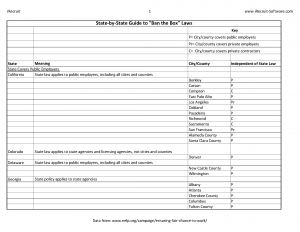By Julia Nattila
In recent years states have seen an increase in legislation that encourages employers to remove certain questions from their application process. The most common is the “Ban the Box” campaign, most recently enacted in Los Angeles.

What is “Ban the Box”?
The “Ban the Box” campaign requests that employers to remove the box on applications which asks applicants to check off whether or not they have been previously convicted of a criminal offense (e.g. a felony or serious misdemeanor). This legislative movement originated from the All of Us or None organization. They called for President Obama to ban this disclosure of personal information from private companies that do business with the federal government by instructing federal agencies to postpone inquiries into applicants’ records until further along in the hiring process. However, “Ban the Box” laws still vary significantly from state to state. These laws can be implemented at both the city/county and state level, and they have even more unique criteria when addressing either private employers or public sector employers.
Why did states enact this law?
The movement started in the late 1990’s but began to gain strength in California in early 2003 when civil rights activists assembled with a common goal to end discrimination based on prior criminal records. According to the National Employment Law Project (NELP), there are an estimated 70 million U.S. adults with arrests or convictions, many of whom are turned away from jobs despite their skills and qualifications.
These laws will allow people who have previously been discriminated against in the hiring process to have a fair chance at employment. People who have been struggling to find employment because of prior offenses or convictions will be able to compete more fairly for jobs and be evaluated solely on their qualifications and skills before disclosing a criminal history. This delay in inquiring about a past criminal record until later in the hiring process is aimed to help discouraged applicants re-enter the workforce.
The logic behind this is that people who may have been automatically disqualified by an employer because of a criminal history would be more likely to reoffend. Studies have shown that applicants who “check the box” are more than 50% likely to be turned down by employers than others that have not committed an offense. Many major companies already have removed the box from their applications, including Facebook, Starbucks, Target and Walmart and many more are expected to follow suit in 2017.
Fair Chance Act
The Fair Chance Act was initiated in New York City and has only been in effect since October 27th, 2015. The Act prohibits most public and private employers in New York City from inquiring about an applicant’s criminal record until after a conditional offer of employment is extended. This act allows for a wider pool of applicants when hiring and helps those who have been previously discriminated against to secure a job. Applicants in New York City are now judged entirely on their experiences and qualifications before employers can factor in a criminal history. So far, over twenty states and over one hundred fifty cities and counties have adopted some type of fair chance policy.
Locations where the law is in effect
Work Opportunity Tax Credits
If you are an employer hiring people with past convictions, you may be interested in learning more about our WOTC tax credit services.
Sources:
http://www.nelp.org/campaign/ensuring-fair-chance-to-work/
http://www.prisonerswithchildren.org/our-projects/allofus-or-none/ban-the-box-campaign/
http://www1.nyc.gov/site/cchr/media/fair-chance-act-campaign.page
https://fairchancenyc.wordpress.com/


